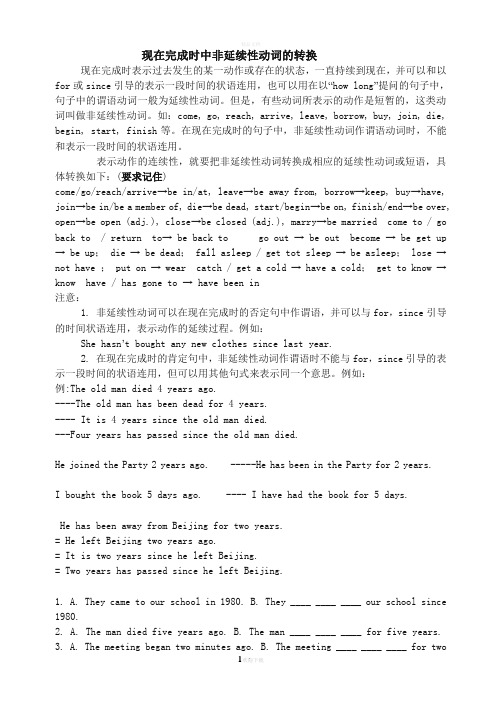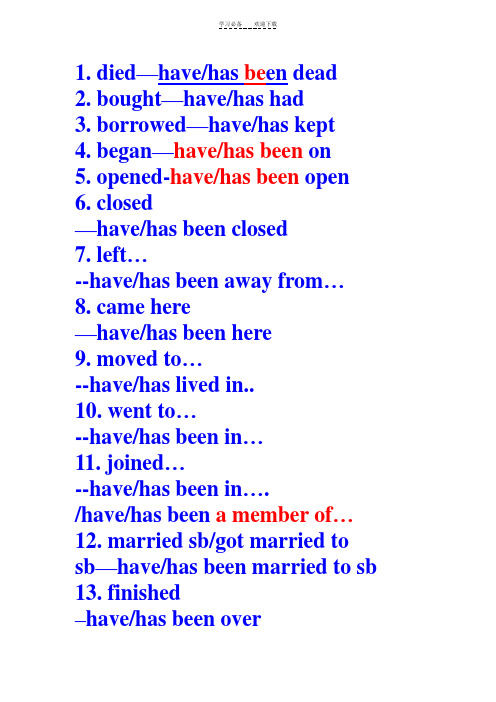延续性动词和短暂性动词笔记
延续性动词和短暂性动词

现在完成时中非延续性动词的转换现在完成时表示过去发生的某一动作或存在的状态,一直持续到现在,并可以和以for或since引导的表示一段时间的状语连用,也可以用在以“how long”提问的句子中,句子中的谓语动词一般为延续性动词。
但是,有些动词所表示的动作是短暂的,这类动词叫做非延续性动词。
如:come, go, reach, arrive, leave, borrow, buy, join, die, begin, start, finish等。
在现在完成时的句子中,非延续性动词作谓语动词时,不能和表示一段时间的状语连用。
表示动作的连续性,就要把非延续性动词转换成相应的延续性动词或短语,具体转换如下:(要求记住)come/go/reach/arrive→be in/at, leave→be away from, borrow→keep, buy→have, join→be in/be a member of, die→be dead, start/begin→be on, finish/end→be over, open→be open (adj.), close→be closed (adj.), marry→be married come to / go back to / return to→ be back to go out → be out become → be get up → be up; die → be dead; fall asleep / get tot sleep → be asleep; lose →not have ; put on → wear catch / get a cold → have a cold; get to know →know have / has gone to → have been in注意:1. 非延续性动词可以在现在完成时的否定句中作谓语,并可以与for,since引导的时间状语连用,表示动作的延续过程。
瞬间动词也叫lsquo短暂动词rsquo和延续性动词

规则动词的过去分词
work visit ask play stay
worked visited asked played stayed
stop drop rob plan prefer
stopped dropped robbed planned preferred
like live move
liked lived moved
C: My uncle joined the army 2 years ago.
3、Linda 已经感冒4、5天了。
A: Linda has
had a cold for 4 to 5 days.
B: It is 4 to 5 days since Linda caught a cold
C: Linda caught a cold 4 or 5 days ago .
6、他们到深圳已经有3年多了。
A: They have been/stayed in Shenzhen for over 3 years.
B: It is over 3 years since they arrived in
Shenzhen.
got to/ reached
C: They arrived in Shenzhen over 3 years ago .
⑤ Mr Black死了三年了。 Mr Black has been dead for three years. Mr Black died three years ago.
⑥小明参军半年了。
Xiao Ming has been a soldier for half a year. Xiao Ming joined the army half a year ago. ⑦我们上了8年学了。
短暂性动词与延续性动词的用法

初中英语中短暂性动词与延续性动词的用法英语中,按动词延续的时间长短,可将动词分为延续性动词和短暂性动词。
延续性动词如learn, study, work, play, wait等。
短暂性动词是非延续性动词,即动作一开始便结束的动词,又可称结束性动词,瞬间动词,如come, go, begin, start, become, join, end, die, buy, arrive,reach, borrow, lend, get to know等。
一.短暂性动词与延续性动词在现在完成时中的用法:现在完成时中用法(一):表示发生在过去,迄今已经完成,并对现在产生影响或产生结果的动作,常用ever, yet, already, just等状语,谓语动词既不过延续性动词,也不过短暂性动词。
如:She has just borrowed the book from the library.(borrow是短暂性动词)I have learned a little about Japanese. (learn 是延续性动词)现在完成时中用法(二):表示始于过去某时并一直延续到现在的动作或状态,常与表示始于过去某一时刻并一直延续到现在的时间状语连用。
如:They have lived in Nantong since 1990. (live 是延续性动词)Mr. Black has worked here since he came to China.(work 是延续性动词)I have learned English for two and a half years.(learn 是延续性动词)所以,在现在完成时中用法(二)中,在表示持续一段时间的句子中,应将短暂性动词转化为相同意义的延续性动词或状态动词。
初中英语中常见的有:例如:1. His grandfather has died for ten years.(F)His grandfather has been dead for ten years.(T) 2. My brother has joined the army for five years.(F)My brother has been in the army for five years.(T) My brother has been an armyman for ten years.(F)3. He has gone away for a week.(F) He has been away for a week.(T)4. The film has begun for fifteen minutes.(F)The film has been on for fifteen minutes.(T)但是,短暂性动词的现在完成时的否定形式能够表示一种延续的状态,所以能够和表示一段的状语连用。
可持续性动词和短暂性动词用法区分

可持续性动词,用来表示主语继续或保持一种状况或态度的动词。
“持续性动词”表示的动作不但可以延续,而且可以产生持久的影响。
1.拥有 have2.具备、具有 possess3.保持 keep4.知道 know5.学习 learn,study6.生活 live7.阅读 read8.睡觉 sleep9.等待、等候 wait10.工作 work11.看、听、闻 look、heard、smell12.喝 drink13.有 have14.跑 run用于现在完成时:for+一段时间。
since+时间点since+一段时间+agosince+从句(一般过去时)等常见的这类动词有:be,have,keep,know,learn,lie,live,read,sing,sleep,stand,stay,wait,walk,watch等。
瞬间性动词(短暂性动词):open,stop,like,love,die,win,close,shot,begin,startenter,finish1、终止性动词:表示不能延续的动作,即动作发生后立即结束.如:begin,arrive,borrow,buy,break,close,come,fall,dic,finish,go ,leave,lend,mary,reach,receive,open,sell,start,stop等.终止性动词的肯定式是不能持续的,所以不能和表示一段时间的状语连用,而终止性的否定式就可以和表一段时间的状语连用,因为否定本身就是可以延续的.如:have a cold是持续性动词,表示“状态”,可与表延续性的时间状语连用,不定冠词不能省略.I′ve had a cold since my arrival(到达 n.).I didn′t go to school because I had had a bad cold for days. catch a cold是短暂性动作,表“动态”:它不能和延续性时间状语连用,不定冠词“a”可有可无,catch可用take,get代替.Put on your coat,or you′ll catch/take/get a cold.Take care not to get cold.但是,若cold前有形容词修饰时,则不定冠词不能省.如:Brown has taken a slight cold.注意下列句子:I have caught a cold for over a week.(×)I have had a cold for over a week.()2、延续性动词:表示可以延续一段时间的动作或状态.如:be,drink,fly,eat,keep,lie,live,rain等.延续性动词常不能和表示一个短暂具体的时间状语连用;这类动词如用于进行时态,则可以和表示一个短暂具体的时刻连用.He worke d at eight yesterday afternoon.(×)He was working at eight yesterday afternoon.()3、代替终止性动词的方法a)用延续性动词代替终止性动词1、用have代替buyMy brother has had(不能用has bought) this bike for almost four years.2、用keep或have代替borrowI have kept(不能用have borrowed) the book for quite a few days.3、用be替代becomeHow long has your sister been a teacher?4、用have a cold代替catch a coldTom has had a cold since the day before yesterday.5、用wear代替put onb)用“be+形容词”代终止性动词1、be+married代marry2、be+ill代fall (get) ill3、be+dead代die4、be+asleep代fall (get) asleep5、be+awake代wake/wake up6、be+gone代lose,die,sell,leave7、be+open代open8、be closed代close/shut9、be+missing(gone,lost)代losec)用“be+副词”代终止性动词1“be+on”代start,begin2“be+up”代get up3“be+back(to)”代return to,come back to,go back to4“be here (there)”代come(arrive,reach,get) here或go (arrive,reach,get) there等等d)用“be+介词短语”代终止性动词1.“be in/at +地点”代替go to /come to2.用be in the army 代替join the army3.“be in/at +地点”代替move to一.短暂性动词与延续性动词在现在完成时中的用法:现在完成时中用法(一):表示发生在过去,迄今已经完成,并对现在产生影响或产生结果的动作,常用ever, yet, already, just等状语,谓语动词既可是延续性动词,也可是短暂性动词。
短暂性动词与延续性动词

短暂性动词,延续性动词和现在完成时短暂性动词是指动作一旦发生就立即结束。
它不能和一段时间连用。
这类动词有:go, come, arrive, leave, begin, start, join, marry等;短暂性动词的肯定式不能与表示一段时间的for或since或how long等状语连用。
例如:His father got ill. I have received his letter.但是,不可以说:His father got ill for a week.I have received his letter for three days.在否定句中,短暂性动词可以和表示一段时间的状语连用。
例如:We haven’t heard from Jane for a long time.I suppose something must have happened to her.延续性动词是指动作发生后还可以延续一段时间或者相当长的一段时间。
如:live, work, study, learn, sleep等,延续性动词可以和表示一段的时间状语连用。
值得注意的是,表示一段时间的状语除了“for+一段时间”外,还有since+n./从句(时间点),since+时间段+ago,疑问词how long,in the past+时间段,all these+时间段,from…to(时间点)以及till/until+n./句子等等。
例如:How long _______ your brother joined the army?A. hasB. hadC. is it sinceD. was there that通过审题,答案B和D很容易被排除,但是稍不注意便会选中答案A;殊不知how long为一段时间的状语,不能与非延续性动词短语has joined连用,所以这题的正确答案是C。
另外,动词的延续性与非延续性还体现在这两种句型中:延续性动词的肯定式+till/ until 短暂性动词的否定式+till/ until请看例句:We waited until he came.I didn’t go to bed until my father came back home last night.如果短暂性动词与表示一段时间的时间状语连用,必须将短暂性动词改为延续性动词。
英语短暂性动词和延续性动词

1. died—have/has be en dead2. bought—have/has had3. borrowed—have/has kept4. began—have/has been on5. opened-have/has been open6. closed—have/has been closed7. left…--have/has been away from…8. came here—have/has been here9. moved to…--have/has lived in..10. went to…--have/has been in…11. joined…--have/has been in…./have/has been a member of…12. married sb/got married to sb—have/has been married to sb 13. finished–have/has been over14. made/became friends—have/has been friends15. began to teach—have/has taught16. lose (lost)—haven’t/hasn’t had17.become (became)—have/has been ******************************* * He went to London in 1990. He is still in London now.→He has been in London since 1990. * I borrowed the book two weeks ago. →I have kept the book for two weeks/since two weeks ago.It is two weeks since I borrowed the book.●He joined the League two yearsago. = It is two years since hejoined the League.= He has been in the League for two years/ since two years ago.同义句(用两种方法变):1.The film began ten minutes ago. It is …since….It is ten minutes since the film began. The film has been on for ten minutes/since ten minutes ago.2.It is three days since he left.He left three days ago.He has been away from here for three days/since three days ago.3.He came here half an hour ago,and he is still here now.It is half an hour since he came here. He has been here for half an hour./since half an hour ago.4.Mary married Tom ten years ago. It is ten years since Mary married Tom.Mary has been married to Tom for ten years/since ten years ago.5.I began to teach English fourteenyears ago.It is fourteen years since I began to teach English.I have taught English for fourteen years/since fourteen years ago.I have been an English teacher for 14 years.Test in class1.He moved to Shenzhen two yearsago.It is two years since he moved to Shenzhen.He has lived in Shenzhen for two years/since two years ago.2.My father went to Shanghai lastweek.It is a week since my father went to Shanghai.My father has been in Shanghai since last week.3.Mike joined the army three yearsago.It is three years since Mike joined the army.Mike has been in the army for three years/since three years ago.4.It is ten minutes since the filmbegan.The film began ten minutes ago.The film has been on for ten minutes/since ten minutes ago.5.He bought the computer fourweeks ago.It is four weeks since he bought the computer.He has had the computer for four weeks/since four weeks ago.。
瞬间动词与延续性动词
__________ I have bought this book for three months.x had √ 1.直接转化成延续性动词 1.直接转化成延续性动词
buy
have
catch (get) a cold
以上三种表示方法适用于所有瞬间动词。 以上三种表示方法适用于所有瞬间动词。 另外,还可用其它表示方法,但只适用于部 另外,还可用其它表示方法, 分瞬间动词。 分瞬间动词。具体办法是将瞬间动词转化为表延 续的动词或者表状态的be+名词 形容词或副词/ 名词/ 续的动词或者表状态的be+名词/形容词或副词/ 介词短语等。 介词短语等。
瞬间动词可以用于现在完成时,但不能和表 瞬间动词可以用于现在完成时, 示一段时间的状语连用。如可说“He has left.”但 示一段时间的状语连用。如可说“ left.”但 不能说“ years.” 不能说“He has left for three years.” 如果要表达 他已走了三年了”可用以下几种表达法: “他已走了三年了”可用以下几种表达法: ago,使用一般过去时 使用一般过去时。 一、用ago,使用一般过去时。 He left here three years ago. ago. +一段时间 一段时间+ 二、用“It is +一段时间+since +一般过去时从句 ” It is three years since he left here. 一段时间+ 三、用“ 一段时间+have/ has passed + since + 一 般过去时从句” 般过去时从句” Three years have passed since he left here.
短暂性动词和延续性动词
短暂性动词和延续性动词可以从字面上理解,持续的动作就是延续动词,反之就是瞬间动词(短暂动词),这个有这种感觉还是很好理解的,你看看下面的浅谈吧延续性动词:live,run,stay,clean,play,hold,watch,teach,read,study,teach ,eat,drink,write,dance, sing,smoke瞬间性动词:open,stop,like,love,die,win,close,shot,begin,startenter,finish1、终止性动词:表示不能延续的动作,即动作发生后立即结束。
如:begin,arrive,borrow,buy,break,close,come,fall,dic,finish,go ,leave,lend,mary,reach,receive,open,sell,start,stop等。
终止性动词的肯定式是不能持续的,所以不能和表示一段时间的状语连用,而终止性的否定式就可以和表一段时间的状语连用,因为否定本身就是可以延续的。
如:have a cold是持续性动词,表示“状态”,可与表延续性的时间状语连用,不定冠词不能省略。
I′ve had a cold since my arrival(到达n.).I didn′t go to school because I had had a bad cold for days. catch a cold是短暂性动作,表“动态”:它不能和延续性时间状语连用,不定冠词“a”可有可无,catch可用take,get代替。
Put on your coat,or you′ll catch/take/get a cold.Take care not to get cold.但是,若cold前有形容词修饰时,则不定冠词不能省。
如:Brown has taken a slight cold.注意下列句子:I have caught a cold for over a week.(×)I have had a cold for over a week.( )2、延续性动词:表示可以延续一段时间的动作或状态。
短暂与延续性动词的转换
11. Has taught 12. has written 13. have had 14. hasn’t played 15. haven’t had 16. have forgotten 17. has never visited 18. hasn’t spoken 19. hasn’t found 20. has been 21. has gone
V. 1. 2. 3. 4. 5. 6. 7. 8. 9. 10.
has been have already had has gone have lived have, been, have been, came has just left, left Have, seen, saw Has, been, went Has, been, he has Speak , have, learnt, started
9. Has been 10. Has worked, since 11. Have seen , since 12. Has been, since 13. Have learnt
•
Linda and Frank married in 1989. Linda and Frank has been married since 1989. • His grandpa died last week. His grandpa has been dead for a week.
•
Linda and Frank married in 1989. Linda and Frank has been married since 1989. • His grandpa died last week. His grandpa has been dead for a week.
短暂性动词与延续性动词详解
短暂性动词与延续性动词相互转换对应表语法讲解:1•现在完成时表示过去发生的某一动作或存在的状态,一直持续到现在,并可以和以for或si nee引导的表示一段时间的状语连用,也可以用在以“ howlo ng提问的句子中,句子中的谓语动词一般为延续性动词。
例:He has been away from Beijing for two years. = He left Beijing two years ago.Whe n did the train arrive here? B. How long ___ the train _____ here?2. 在现在完成时的肯定句中,非延续性动词作谓语动词时,不能和表示一段时间的状语连用。
但可以用其他句式来表示同一个意思。
例:Lucy has come back.The old man died 4 years ago. = The old man has bee n dead for 4 years.He has bee n away from Beiji ng for two years.=He left Beiji ng two years ago.=It is two years since he left Beiji ng.=Two years has passed since he left Beiji ng.3. 非延续性动词可以在现在完成时的否定句中作谓语,并可以与for,since引导的时间状语连用,表示动作的延续过程。
例如:Shehasn' bought any new clothes since last year.I haven' borrowed the book for a long time.巩固习题:1. Whe n he arrived at the bus stop, the bus _______ for 20 minu tes.A. has leftB. had leftC. has bee n awayD. had bee n away2. I _____ the League for 5 years so far.A. jo inedB. have joinedC. have bee n in3. The factory ______ si nee the February of 1988.A . has bee n ope n B. has ope ned C. was ope n D. ope ned4. Mary and Rose ______ friends since they met in 2000.A. have madeB. have bee nC. madeD. have become5. The meeti ng _____ for a week now.A. has fini shedB. has en dedC. has bee n over6. Miss Gao ____ this school for n early 5 years.A. has bee n inB. has come toC. has taught7. Be n ____ a teacher for 4 years .A. has bee nB. has becomeC. wasD. became8. I ______ home for a week.A. have retur nedB. have bee n backC. retur ned9. How long _______ h e _______ ?A. diedB. has, diedC. has, bee n dead10. --- How long can I ______ the book? --------- Two weeks.A. borrowB. le ndC. getD. keep11. He _______ the car for a week.A. boughtB. has boughtC. has had12. --- How long ____ you _____ ill ? ----- Two weeks.A. did fallB. have, fellC. have, been13.Si nee 2000, he ___ his hometow n.A. has leftB. has moved awayC. has bee n away from14.1 'll le nd you the book , but you can only ___ it for 2 days. 学习-----好资料A. borrowB. keepC. take15. The bus _____ on the road for 2 hours so far.A. has stoppedB. stoppedC. has bee n16. Tom is ill in hospital. He ______ a cold for several days.A. isB. catchesC. has caughtD. has had17. He _______ f or 2 hours.A. got upB. has got upC. has bee n up。
- 1、下载文档前请自行甄别文档内容的完整性,平台不提供额外的编辑、内容补充、找答案等附加服务。
- 2、"仅部分预览"的文档,不可在线预览部分如存在完整性等问题,可反馈申请退款(可完整预览的文档不适用该条件!)。
- 3、如文档侵犯您的权益,请联系客服反馈,我们会尽快为您处理(人工客服工作时间:9:00-18:30)。
持续动词与瞬间动词英语的行为动词有持续性动词和瞬间性动词之分,使用中应注意两者的区别。
持续性动词表示一个动作可持续一段时间,此类动词有do, live, have, keep, wear, sleep, wait, work, play, stay, know, sing, dance, write, study, rest, talk, walk等.瞬时性动词表示不能持续的动作,这种动作发生后立即结束,此类动词有open, close, finish, begin, come, go, arrive, reach, leave, move, borrow, buy, die, lend, join, catch, get, win, fail等一、持续性动词表示一个动作可以持续一段时间或更长时间。
常见的有study, play, do, read, learn, drive, write,clean, slean, sleep, speak, talk, wait, fly, stay, write, sit, stand, lie, keep等。
二、瞬间性动词表示一个动作发生在一瞬间,非常短暂。
亦称终止性动词。
常见的有begin, start, finish, go, come, leave, find, get up, arrive, reach, get to, enter,hear, stop, open, close, become, buy, borrow, lend, happen, join, lose, renew, die, take away, put up,set out, put on, get on/off等。
以上已集中了初中教材的大部分持续性动词及瞬间性动词。
三、用法1、持续性动词在完成时中能与表示持续一段时间的状语连用,而瞬间性动词则不能。
例如:His parents talked with the teacher for half an hour.(他的父母跟老师谈了半个小时。
)My mother has lain in bed for 3 days.(我母亲生病卧床已经三天了。
)My parents have lived in Shanghai since 1950.(我父母亲从1950年起就住在上海了。
)2、瞬间性动词在完成时中如要与表示持续一段时间的状语连用,通常的方法:(1)用意思相当的持续性动词来替换,例如:He has been in the army/a soldier for htree years.(他参军已有3年了。
)不能用has joinedShe has been up for quite some time.(她起床已有好久了。
)不能用has got upHas your brother been away from home for a long time?(你哥哥离家已有好久了吗?)不能用has left 初中课本中的常用瞬间动词相应持续性动词关系如下:1、go——be away2、come——be here3、come back——be back4、leave——be away (be not here)5、buy——have6、borrow——keep7、die——be dead8、begin——be on9、finish——be over 10、open——be open 11、close——be closed 12、lose——be lost 13、get to know——know 14、turn on——be on 15、get up——be up 16、sit down——sit/be seated17、join——be in(…)或be a…member a)用延续性动词代替终止性动词1、用have代替buyMy brother has had(不能用has bought) this bike for almost four years.2、用keep或have代替borrowI have kept(不能用have borrowed) the book for quite a few days.3、用be替代becomeHow long has your sister been a teacher?4、用have a cold代替catch a coldTom has had a cold since the day before yesterday.5、用wear代替put onb)用“be+形容词”代终止性动词1、be+married代marry2、be+ill代fall (get) ill3、be+dead代die4、be+asleep代fall (get) asleep5、be+awake代wake/wake up6、be+gone代lose,die,sell,leave7、be+open代open 8、be closed代close/shut 9、be+missing(gone,lost)代lose延续性动词表示能够延续的动作,这种动作可以延续下去或产生持久影响。
如:learn,work, stand, lie, know, walk, keep, have,wait, watch, sing, read, sleep, live, stay等。
终止性动词也称非延续性动词、瞬间动词或短暂性动词,表示不能延续的动作,这种动作发生后立即结束。
如open, close, finish, begin, come, go, arrive, reach, get to, leave,move, borrow,buy等。
Come-be hereGo – be thereleave→be away,borrow→keep,buy→have,begin/start→be on,die→be dead,move to→live in,finish→be over,join→be in/be a member of, open sth.→keep sth. open, fee l ill→be ill,get up→be up,catch a cold→have a cold come here --- be here,go there --- be there, become --- be,come back --- be back,fall asleep --- be asleep,get to/ arrive/reach --- be (in), leave --- be away from,get to know --- know,go (get) out →be out,put on→ wear;例:The old man died 4 years ago.----The old man has been dead for 4 years.---- It is 4 years since the old man died. ---Four years has passed since the old man died.He joined the Party 2 years ago.-----He has been in the Party for 2 years.I bought the book 5 days ago.---- I have had the book for 5 days.补充练习:1. When he arrived at the bus stop, the bus ________ for 20 minutes.A. has leftB. had leftC. has been awayD. had been away2. I ______ the League for 5 years so far.A. joinedB. have joinedC. have been in3. The factory ________ since theFebruary of 1988.A . has been open B. has opened C. was open D. opened4. Mary and Rose _______friends since they met in 2000.A. have madeB. have beenC. madeD. have become5.You mustn't ________ until he comes back.A. be awayB. leaveC. be left6.The meeting _______ for a week now.A. has finishedB. has endedC. has been over7.Miss Gao ______ this school for nearly 5 years.A. has been inB. has come toC. has taught8.Ben ______ a teacher for 4 years .A. has beenB. has becomeC. wasD. became9. I ______ home for a week.A. have returnedB. have been backC. returned10. How long _______ he ________ ?A. diedB. has, diedC. has, been dead11. ----- How long can I ______ the book? ------ Two weeks.A. borrowB. lendC. getD. keep12.He ________ the car for a week.A. boughtB. has boughtC. has had13.-----How long _____ you _____ ill ? -----Two weeks.A. did fallB. have, fellC. have, been14.Since 2000, he _____ his hometown.A. has leftB. has moved awayC. has been away from15.I'll lend you the book , but you can only _____ it for 2 days.A. borrowB. keepC. take16.The bus ______ on the road for 2 hours so far.A. has stoppedB. stoppedC. has been17.Are you _____ the jacket these days?A. wearingB. putting onC. dressingD. on18.He ________ for 2 hours.A. got upB. has got upC. has been up19. Tom is ill in hospital. He _______ a cold for several days.A. isB. catchesC. has caughtD. has had。
